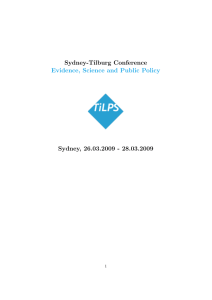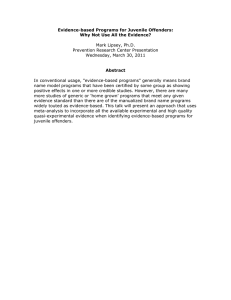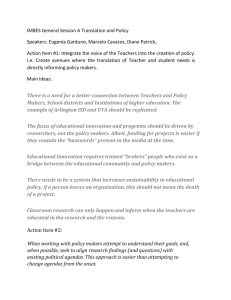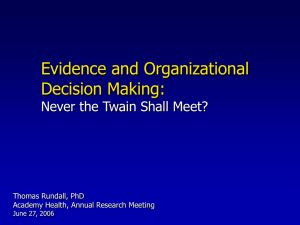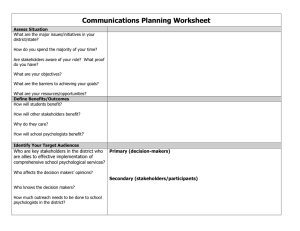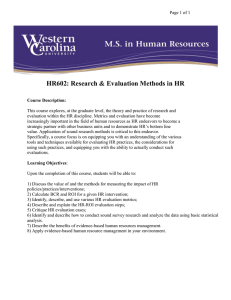Policy-Research Interface Simin Davoudi
advertisement
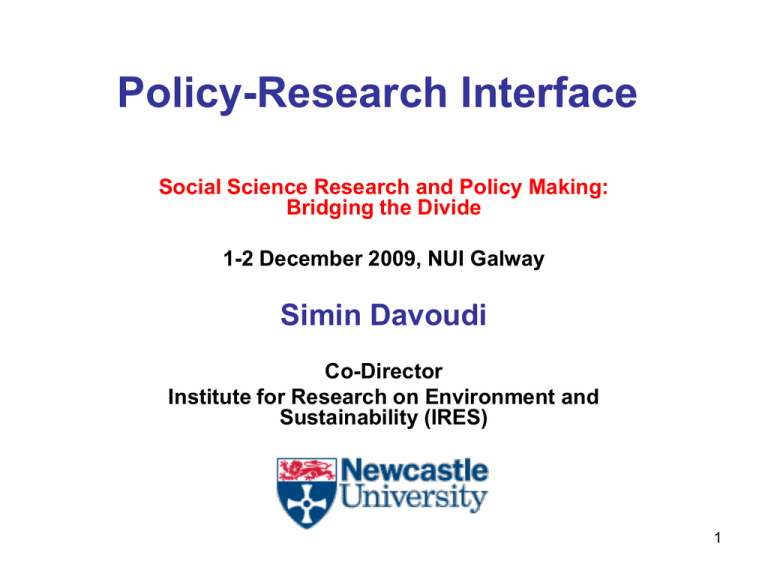
Policy-Research Interface Social Science Research and Policy Making: Bridging the Divide 1-2 December 2009, NUI Galway Simin Davoudi Co-Director Institute for Research on Environment and Sustainability (IRES) 1 Bridging the Gap! • Academics and the problem of „blue skies‟ research • Policy makers and the problem of „little effects‟ 2 Evidence-based Policy • “This Government expects more of policy makers. More new ideas, more willingness to question inherited ways of doing things, better use of evidence and research in policy making…” Cabinet Office, 1999, White Paper, para. 6 3 • The aim of the network: – To advise the government on its planning research priorities – To facilitate knowledge exchange between researchers and policy makers 4 Planning Research Network Wider stakeholders Research capacity pacicapacity POLICY DOMAIN policy concerns evidencebased policy THE NETWORK RESEARCH DOMAIN research questions policy-related research policy recommendation s Research capacity research activities 5 Instrumental view of policy-research interface Assumes that the relation between policy and research is unproblematic, linear and direct: • Expert ‘on top’ model • Expert ‘on tap’ model • Research leads policy, policy is research-driven • Research follows policy, research is policy-driven • It contains an element of scientific inevitability • Research is shaped by policy concerns 6 The ‘expert on tap’ model • Evidence has to be timely, intelligible , digestible and available on demand • „What matters is what works‟ mantra • Research has to be not only „useful‟ but also „useable‟ 7 The enlightenment view • The benefits of research are indirect and sometimes take longer to be realised. • The aim is to illuminate the landscape within which policy decisions are made • The emphasis is on evidence-informed rather than evidence-based policy 8 Much of the drive for evidence-based policy is rooted in the utilitarian view • Underpinned by 3 interrelated misconceptions: – Policy making is a rational process – Evidence can only be generated through positive science – Experts are apolitical, value free; and know best 9 The mismatch between: • How we think policy process should work, and how it actually works, which is: – messy, uncertain, unstable and essentially political (Young et al, 2002) • Policy making is a matter of „bricolage‟ rather than consistent principles • Most policies are compromise hit and miss affairs. (Ball, 1998) 10 Having access to all information doesn’t necessarily make policy-making easier! • “… there is nothing a government hates more than to be well-informed; for it makes the process of arriving at decisions much more complicated and difficult” (John Maynard Keynes in: Skidelsky, 1992:630). 11 How research is used depends on the context within which it is used! • Practical, institutional and political factors can lead to „problem of little effect‟: • “Little of the research commissioned by departments or other academic research was used by policy makers” (Cabinet Office, 1999:36) 12 Research is not the only contender for influencing policy • There are other powerful competitors, such as: – Ideology – Interests – Institutional norms and practices » (Weiss, 2001) 13 Ideology • Basic values and underlying belief systems • These shape and, sometimes, determine policy outcome 14 Influence • …of institutional traditions, culture and capacity to absorb, comprehend and verify multiple claims to evidence. • „Intelligent users‟ of research • Demand for „quick fixes‟ may discourage the commissioning or use of long term strategic research • Finding the right answers for the wrong questions! • Information overload 15 Interest • People‟s & organisations‟ self-interests and expediencies • Research agenda is politically driven “Cracking the Nutt Case” BBC News Headline, 11/11/09 • Cherry picking evidence 16 Contrary to the instrumental view… • “There is more to policy and practice than the disinterested pursuit of truth and wisdom”. (Solesbury, 2002: 93) • Engaging with policy makers requires a sound understanding of the socio-political nature of policy making process. 17 Shifting the emphasis • Narrow instrumentalism curtails imagination and creativity • It is based on fragile assumptions about policyresearch interface • Less emphasis on „evidence-based policy‟ and more on „evidence-informed society‟ 18 For more details see: • Davoudi, S., 2006, Evidence-based Planning: Rhetoric and reality, DiSP, 162(2):14-24 19
